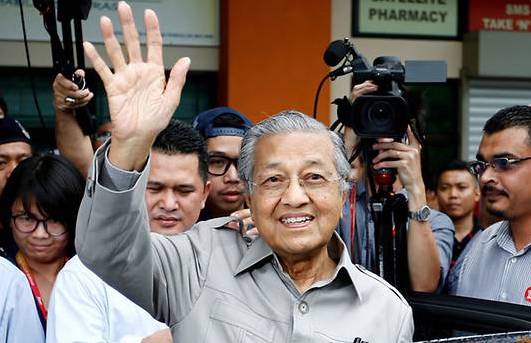Malaysian makeover: At 92, Mahathir seeks to be PM again

(Reuters) – At 92, Mahathir Mohamad will become the world’s oldest person to be voted prime minister if he wins Malaysia’s upcoming general election. But to do that, he needs to woo people in their 20s and 30s, the country’s dominant – and mostly undecided – vote block.
With the Southeast Asian nation’s next election due by August, Mahathir is reworking his image – no longer the autocratic prime minister who ruled Malaysia for over two decades, he is projecting himself as the opposition’s avuncular elder statesman.
He has a vibrant Twitter feed, peppered with selfies and cheerful posts to endear himself with millennials.
“Seeking inspiration to fight Dark Forces,” read a tweet Mahathir posted in December with a photo of him and his wife watching ‘Star Wars: The Last Jedi’. It went viral, with over 8,500 retweets and around 15,000 likes.
Mahathir’s makeover includes burying the hatchet with his fiercest critic and former deputy prime minister, Anwar Ibrahim, who he sacked in 1998 and jailed the following year on charges of corruption and sodomy, which is a crime in Malaysia. Their feud has shaped the country’s political landscape over the past two decades.
Anwar is now serving a second prison term on a sodomy charge, but has signalled his acceptance to Mahathir leading the opposition campaign to oust current Prime Minister Najib Razak and his ruling Barisan Nasional (BN) alliance. In return, Mahathir has promised he will seek a royal pardon for Anwar if he wins the election and then step aside and let him be prime minister.
“I’m not apologetic for Mahathir’s past,” said Nurul Izzah, the 37-year-old daughter of Anwar who is the co-director for the opposition’s election campaign.
“I put on record, he has a lot to answer for and I’m appreciative that he did not defend himself on the day of taking up the position (of prime ministerial candidate),” she said in an interview.
Anwar’s wife, Wan Azizah Wan Ismail, has been named the candidate for deputy prime minister.
“I am indebted and I say thank you to Anwar,” Mahathir said after he was declared the prime ministerial candidate, saying it would not have been easy for Anwar to accept the deal.
DIVISIVE FIGURE
Mahathir’s image on social media is that of a droll but sage father-figure coming out of political retirement to help right the wrongs of Najib and his government.
“He has reincarnated himself well. You can’t find ‘Mahathir the dictator’ on his social media platforms,” said Adib Zalkapli, an analyst with risk consultancy Vriens & Partners. “Young voters, especially those below the age of 30, do not remember his history with Anwar or his leadership style.”
Syed Saddiq Syed Abdul Rahman, the youth chief of Mahathir’s party and manager of his Twitter account, says the ex-premier carefully works on his online image. He writes down social media posts on paper and hands it over, Syed Saddiq said.
“I only help type in. He does everything,” said the 25-year-old youth leader.
The messaging appears to be working – Mahathir’s Twitter following rose from 15,000 early last year to over 300,000 now.
“On Facebook, his target demographic are in their 30s and 40s, and on Twitter he interacts with millennials. He’s also planning on starting an Instagram account,” said Syed Saddiq, adding he finds it hard to keep up with Mahathir.
Between 2013 and 2017, about two million new voters registered in Malaysia, many of whom are between the ages of 21 and 30, according to estimates by independent polling agency Merdeka Center.
Malaysians between 21 and 40 accounted for 42 per cent of the 14.6 million registered voters in the second quarter of 2017, according to estimates by youth voting advocacy group Watan.
A survey published in September by Merdeka Center, an independent polling agency, found that 70 per cent of respondents between the ages of 21 to 30 were not interested in politics and were far more concerned with inflation, corruption and their livelihoods.
Most young Malaysians only know Mahathir as the “father of modernisation”, who brought a diversified and high-tech manufacturing base to an economy that had long relied on plantations and mining.
JAILED WITHOUT TRIAL
But many others remember the accusations against him of cronyism, undermining the judiciary and suppressing dissent. In the 1980s, many opposition and civil society leaders were jailed without trial, and newspapers critical of Mahathir’s administration were shut down.
Kua Kia Soong, a former opposition lawmaker who was among those detained in the 1980s, says he blames Mahathir for building the very system that he is now trying to fight.
“To have such a person as the leader of the opposition to Najib and the Barisan Nasional is a big letdown,” he said.
“He hasn’t shown he is a born-again democrat.”
Mahathir turned on his former protege Najib in 2015 after news broke of a multi-billion-dollar scandal involving state fund 1Malaysia Development Berhad (1MDB), which faces money-laundering probes in at least six countries.
Najib has denied any wrongdoing.
A Merdeka Center survey in December showed that Najib is likely to retain power in the next elections thanks to a divided opposition and the redrawing of electoral boundaries that critics say favours the government.
The opposition Pan-Malaysian Islamic Party (PAS) has refused to join Mahathir’s coalition, raising the possibility of multi-cornered contests that will likely split opposition votes.
Najib’s alliance won 133 seats of 222 parliamentary seats in the 2013 elections but lost the popular vote. The opposition got 89 seats, including 21 that went to PAS.
The opposition will need to lean on Mahathir to bring in young voters and rural Malays – a demographic that the opposition has long failed to win. Mahathir, his supporters say, appeals to both segments.
“In rural areas, Mahathir is a household name. He is an important factor when it comes to the rural Malays,” said Saifuddin Abdullah, an opposition leader aligned with Mahathir.

